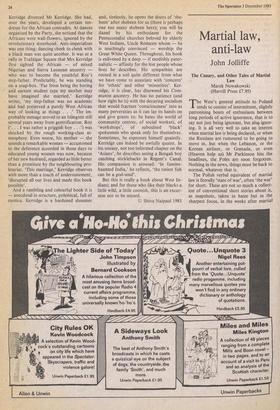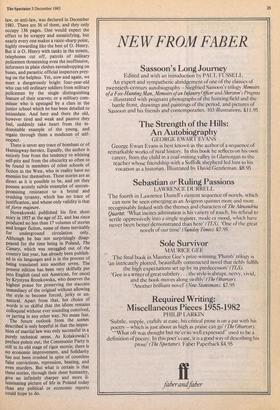Martial law, anti-law
John Jolliffe
The Canary, and Other Tales of Martial Law Marek Nowakowski (Harvill Press £7.95) The West's general attitude to Poland
tends to consist of intermittent, slightly patronising bouts of enthusiasm between long periods of active ignorance, that is to say not just being ignorant, but also ignor- ing. It is all very well to take an interest when martial law is being declared, or when the Russians are rumoured to be going to move in, but when the Lebanon, or the Korean airliner, or Grenada, or even (Heaven help us) Mr Parkinson hits the headlines, the Poles are soon forgotten. Nothing in the news, things, must be back to normal, whatever that is,
The Polish verbal equivalent of martial law is literally `state of war', often 'the war' for short. These are not so much a collect- ion of conventional short stories about it, as snapshots, taken in haste but in the sharpest focus, in the weeks after martial law, or anti-law, was declared in December 1981. There are 36 of them, and they only occupy 136 pages. One would expect the effect to be scrappy and unsatisfying, but nearly every one makes a razor-sharp point,
highly rewarding like the best of 0. Henry. But it is 0. Henry with tanks in the streets,
telephones cut off, patrols of military policemen threatening even the inoffensive, informers in plain clothes eavesdropping on buses, and parasitic official inspectors prey- ing on the helpless. Yet, now and again, we meet a dangerously bright four-year-old who can tell ordinary soldiers from military policemen by the single distinguishing feature of their scarves; or a military com- missar who is upstaged by a class in the junior school which he has been detailed to intimidate. And here and there the old,
however tired and weak and passive they feel, suddenly take heart from the in- domitable example of the young, and regain through them a modicum of self- respect.
There is never any trace of bombast or of Hemingway-heroics. Equally, the author is entirely free from the tendency to whining self-pity and from the obscurity so often to be found in members of other schools of fiction in the West, who in reality have no enemies but themselves. These stories are as direct as it is possible to be, and yet they
possess acutely subtle examples of uncom- promising resistance to a brutal and crushing tyranny, which has no trace of justification, and whose only validity is that of force majeure.
Nowakowski published his first short story in 1957 at the age of 22, and has since produced no less than 17 volumes of stories and longer fiction, some of them inevitably for underground circulation only.
Although he has not surprisingly disap-
peared for the time being in Poland, The Canary, which was smuggled out of the
country last year, has already been publish- ed in six languages and is in the process of being translated into another seven. The present edition has been very skilfully put into English (and not American, for once) by Krystyna Bronkowska, who deserves the highest praise for preserving the staccato immediacy of the original without allowing the style to become forced, jerky or un- natural. Apart from that, her choice of words is so skilful that the idiom remains colloquial without ever sounding contrived, or jarring in any other way. No mean feat. The future outlook from the scenes described is only hopeful in that the impos- ition of martial law was only successful in a purely technical sense. As Kolakowski's" preface points out, the Communist Party is still in its old stage of rigor mortis; there is no economic improvement, and Solidarity has not been crushed in spite of countless false convictions, repression, beating, and even murders. But what is certain is that these stories, through their sheer humanity, give an infinitely sharper and more il- luminating picture of life in Poland today than any political or economic reports could hope to do.















































 Previous page
Previous page